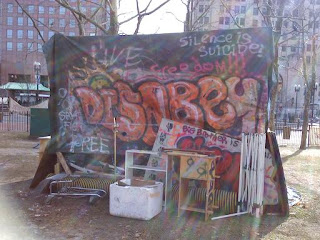
At Occupy Providence, I spoke to a twenty-six year old named Charles, who is a self-proclaimed anarchist and has been at Occupy Providence for ninety-three days. Charles spoke about his first encounter with government policies that infringed on his rights as a citizen of the United States: at age sixteen, he wrote a political poem, which he posted on the website deviantART, an "online art community for artists and art lovers to interact in a variety of ways, ranging from the submission of art to conversations on a number of topics. In its purest form, deviantART is a means for expressing yourself in a variety of ways" ("deviantART"). Charles received a government email soon after posting his poem that told him he had to take the poem down from the website or else the government would press charges against him. He simply wrote back that he would not take the poem down and that if someone wanted to press charges, he would happily go to the Supreme Court and defend his First Amendment freedom of speech.
Charles's three main reasons for being at Occupy Providence are:
1. To fight for the civil rights and freedom of the people
2. To help end international slavery
3. To work towards a stabilized economy
He stresses the fact that he does believe in having a government to maintain order within the country. However, he is fighting for a government that cares about the people it governs and not just about its own wealth and power. He insists that as more people continue to join the Occupy movements, we will come closer and closer to reaching this goal.
Seeing the occupiers out in the cold, fervently relaying their message to young people reminded me of the last two articles that we read for class. Both the Ayvazian article and the Love and Helmbrecht article talked about what real activism means. Ayvazian emphasizes the fact that an ally (someone who fights for a cause that has an effect on people other than oneself) is "highly motivated," "extremely clear and consistent on an issue," and takes risks. This encompasses everything that I saw in the occupiers who I spoke to today. An ally also takes action by talking to others just like him/her about the issues at hand, which is something that the occupiers were all too eager to do.
Love and Helmbrecht describe the difference between consumerism and activism, arguing that activism is about going out and actually fighting and talking to people and putting in work in order to make a change. People often think that just buying a product (maybe a t-shirt that says "We are the 99%") is the same as fighting for the cause, but according to Love and Helmbrecht, the people standing outside in the cold and rallying at the Occupy movements are the ones taking real action.
While talking to the activists at Occupy Providence, I was also reminded very much of the two websites we looked at: "People Like Us" and "The Center for Working Class Studies." Charles spoke vehemently about the way our own banks rob us by taking out unnecessary fees from the money that we worked hard to make. He also talked about the Bilderbergs, which he defined as a group of multibillionaires who have absolute power in this country. It made me think about the economic inequity in this country and its effects on the social and political power of different groups of people.
Although I could not stay outside for very long due to the cold, I got to hear a lot of new information that I knew nothing about before and that I plan on researching much more on my own.
For some more concrete information on what the Occupy movement is fighting for, watch this video:
Very inspirational video Jean!
ReplyDeleteIt's good to hear that you got something out of the experience.
ReplyDelete